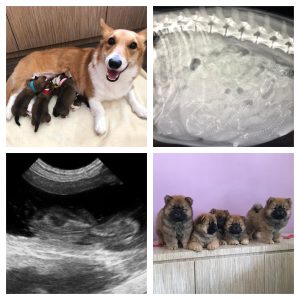Artificial Insemination In Dogs
Terminology:
Sire – male dog
Dam/Bitch – female dog
What is artificial insemination (AI)?
Artificial Insemination (or AI) refers to the process of artificially implanting dog semen into the cervix or uterus of the female dog (dam or bitch) in order to achieve pregnancy.
This is done during the most fertile period of the dam’s oestrus cycle.
AI requires knowledge of the endocrinology of the oestrus cycle of the dam. Ovulation and insemination must be coordinated in order to achieve a successful outcome (i.e., pregnancy).
In recent years, AI has found its niche amongst dog breeders and pet owners alike.
The procedure should only be carried out by experienced inseminators or veterinarians.
Indications for Artificial Insemination
AI is an assisted reproductive technique used to compensate for the causes of canine infertility.
It is most frequently indicated in dams that have normal oestrus cycle but have a history of failure to conceive after natural mating. AI is also performed in animals (sire or dam or both) that are unable or unwilling to breed naturally.
Other indications of AI include:
- Desired sire from a different region
- Vaginal abnormalities of the dam
- Sub fertile female due to age or previous scar tissue left from a difficult past whelping (birth)
AI helps to increase the gene pools of many breeds.
Pre-breeding Criteria
First and foremost, both the sire and dam must be healthy. A pre-breeding general health assessment must be conducted. The genitalia of both the sire and dam must be examined.
Past-breeding details must be discussed. For the dam, these include whether there were past successful pregnancies, litter sizes and health of the puppies born. For the sire, discussion will include past-breeding results (success or failures to impregnate other dams).
Only healthy animals without heritable genetic defects (e.g., hip dysplasia in large dogs) need be considered for AI.
Ideally, both the sire and dam should be fully vaccinated, dewormed and on heartworm prevention. Any current drug therapies, diets that may interfere with a healthy pregnancy should be discussed with the veterinarian.
Serologic testing for Brucella canis may be required in some regions.
The age of the dam during the time of the requested AI is important. Generally, the breeding life-span of the dam is between the ages of 1 to 5 years.
The sire’s semen quality should also be assessed. As poor semen quality may result in unsuccessful pregnancies or small litter sizes.
However, even with a healthy dam and sire and the right timing, fertilization and a successful pregnancy is not a guarantee.
[THINK women undergoing IUI (Intra-Uterine Insemination)!]
So When Is The Right Time?
The ideal breeding age of the dam is between the ages of 1 to 5 years.
For the dam to be bred naturally or by AI, she must be in heat (which occurs about twice a year) and about to or recently ovulated.
This stage of her reproductive cycle can be gauged from hormonal assays (Progesterone Assay or Luteinizing Hormone Assay) or by vaginal cytology (checking swabs of vaginal cells under the microscope). Vaginal cytology helps to predict oestrus and ovulation, and the accuracy of this test depends largely on the experience of the person preparing the sample and reading the cell types.
For the sire’s semen, it is assessed before or at the time of implantation for sperm counts, motility and morphology (appearance or structure). For a reliable vaginal AI, 200 million motile sperm with forward motility is ideal. Sperm is also checked for abnormalities (abnormal heads, double midpieces and/or tails, kinked or ruptured midpieces, coiled tails etc.). Normal morphology is when there us 60% normal sperm.
For the Owner/Breeder
- Be aware if the onset of proestrus in your dam (female dog). Note down the date when you observe swelling of the vulva and a bloody discharge.
- Co-ordinate with your inseminator/veterinarian to bring your dam in every 2-3 days for vaginal cytology until the ideal day for the AI to be performed.
Post AI Pregnancy Check
Co-ordinate with your veterinarian on the best time to return for a pregnancy diagnosis/check.
Generally, pregnancy diagnosis is performed via abdominal ultrasonography.
At Vet Practice
Here at Vet Practice, we have successfully achieved many healthy litters through AI.
If you are considering AI for your pet dog, please give us a call and make an appointment for a pre-breeding assessment and discussion.
Call us at 6462 1757, 6462 1541


